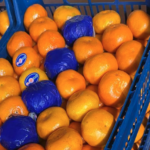Opinion: EU School Fruit Scheme proves effective

By the Netherlands' Wageningen University and Research Centre. This article originally appeared on the university's website and has been republished with permission.
The EU School Fruit Scheme has several advantages: it's healthy, it encourages children to try new foods at home, it has the support of parents, it provides clarity on 10.00 am snack time and it's informative.
Currently, only 1% of children eat enough vegetables and only 5% eat enough fruit. We would therefore like to explain how the EU School Fruit Scheme works and why it works.
Different times
The Netherlands Nutrition Centre (Stichting Voedingscentrum Nederland) recommends 150 grams of vegetables and 1.5 pieces of fruit for children aged four to eighteen. Children between the ages of nine and thirteen should eat 150 to 200 grams of vegetables and two pieces of fruit each day.
Children between the ages of nine and thirteen should eat 150 to 200 grams of vegetables and two pieces of fruit each day.
This recommendation is easy to meet if fruits and vegetables are consumed at different times throughout the day, such as 10.00 am or lunchtime.
School policies
Healthy food policies are becoming increasingly important at schools, often in consultation with or at the initiative of parents. The EU School Fruit Scheme supports these efforts.
“Participating in the EU School Fruit Scheme can help children make a habit out of taking fruits and vegetables to school,” says Els van Coeverden from the Steunpunt Smaaklessen and the EU School Fruit Scheme.
The EU School Fruit Scheme introduces children to different types of fruits and vegetables.
“Even picky eaters are happy to join in at school,” says Van Coeverden.
“As we’ve found in practice: seeing is eating! Children only become accustomed to an unfamiliar flavour after trying it ten to fifteen times. Taste is something you have to develop. In addition, the EU School Fruit Scheme makes both children and parents aware of the importance of healthy food at school.”
As part of the EU School Fruit Scheme, primary schools receive three portions of fruit per child, every week for twenty weeks. These deliveries are free and come from the same preferred supplier.
Results
The scheme is fully funded by the European Union and also includes free teaching materials developed by Wageningen University & Research.
These materials consist of a textbook and a digiboard module. Wageningen also serves as the primary point of contact for these schools and helps them implement their school fruit policy.
After twenty weeks of free fruits and vegetables, the schools can carry on at their own initiative. The school can either ask parents to give their children fruit and vegetables to take to school or parents can sign a school fruit subscription with a school fruit supplier.
More than half of primary schools (Dutch) have participated at least once in the EU School Fruit Scheme, which was first introduced in 2011. This amounts to a total of 5,500 schools.
The five-year evaluation report for the EU School Fruit Scheme (2011-2016) revealed that more pupils brought fruits and vegetables with them at 84% of the participating schools after the scheme was implemented.
In addition, 90% of schools said their pupils were introduced to more fruit and vegetable varieties and that they now know more about the importance of healthy eating.
The evaluation also found that most children tend to enjoy variation and are quite willing to try new fruits and vegetables. Finally, 81% of the schools indicated that the EU School Fruit Scheme had a lasting impact on their pupils’ fruit and vegetable consumption.
“Attention to healthy eating at school contributes to healthy eating habits,” says Van Coeverden.
Registration
Some 2,600 primary schools can participate in the scheme this year. Registration (Dutch) is possible from 4 September to 15 September 2017. The fruit and vegetable deliveries will start in the week of 13 November 2017 and run until 20 April 2018.
While schools can participate free of charge, participation conditions do apply. Practical tips and experiences have been collected from the participating schools.
Research
Parental involvement is an important success factor for initiatives like these. However, not all parents are the same; they each have their own wishes and capabilities, which means activities have to be tailored accordingly.
Wageningen is therefore conducting research (Dutch) on the wishes, capabilities, success factors and limitations of both parents and schools regarding the availability of fruits and vegetables at school.
Based on the results of this study, the researchers hope to develop an effective approach for primary schools and parents to increase the availability and consumption of fruits and vegetable at school.













































